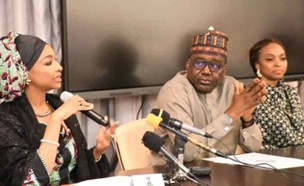 10 June 2012, Sweetcrude, CALABAR – THE Nigerian Electricity Regulatory Agency (NERA) says the government has earmarked N100 billion to support the Multi-Year Tariff Order (MYTO) in the country.
10 June 2012, Sweetcrude, CALABAR – THE Nigerian Electricity Regulatory Agency (NERA) says the government has earmarked N100 billion to support the Multi-Year Tariff Order (MYTO) in the country.
Mr Eyo Ekpo, NERA’s Commissioner, Market Competition and Rates, said in Calabar that government would provide N50 billion this year and additional N50 billion in 2013 to support the new tariff regime.
“Over the next two to three years the government is going to make available N50 billion this year and N50 billion next year to support the new electricity tariff regime.
“And by 2014, most of the subsidy will go out except the cross-subsidy provided by the higher classes for the R1, that one will be made but the government subsidy will go out of the Nigerian electricity market. ’’
He said that people were not paying the right price for the power sector over the years.
“People have not been paying the right price for the service. Over the years, we have situation where power sector was not earning enough funds to be able to provide full range of services to its customers and to expand the service.
Ekpo also explained how reduction in tariff would benefit the consumers in the country.
“The new tariff will actually come down, how is it possible for the tariff to come down? Well, it is possible because we have different customer classes. You and I are not in the class of rural dwellers.
“The rural dwellers have their tariff as Residential one (R1). There are certain class of people in Nigeria who need to be specially taken care of. They are called life line customers and for this life line customers, you don’t need to establish a cost effective tariff.
“So what we did was to calculate and we did our research and found out that it costs us about N23 to N24 to provide one unit of electricity in your house, that is the actual cost today in Nigeria.
“For the R1 customer, we say we can’t afford to pay N24 plus profit for the service, so we reduced their tariff to N4 per unit.”
He said those in the rural dwellers would not consume more than 45 -50 kilowatts of electricity in a month.
According to him there are 14 customer classes for the new tariff regime.
“The R1 does not pay fixed charges, they pay only the flat N4 per unit of consumption, that is a major benefit for them.
“But before they used to pay N500 for fixed charge and N2.20k for electricity charge when you aggregate that into one, it becomes N7-N8.
“But today they pay only N4, that is why I can tell you there is actually reduction for them. They will pay that for a maximum of 50 units a month.”
He, however, regretted that Nigerians had not invested much in expanding the network in the electricity sector.
Ekpo said that the privatisation of power supply would boost electricity supply in the country.
“To be able to encourage the private sector to come in, if we take our entire N9.5 trillion that we are going to earn in 2012 to invest in the power sector, it will give us about 25,000 megawatts of electricity with associated transmitted and distributed asset that is nothing for a country of about 160 million people.
“We are saying that we need intervention from the private sector, unless we can adjust the tariff to show that people who come into the business can recover their money, we will not see investment.
“And we will not have the management that will come in and remove corruption that we have and deal with our metering issues, assess issues and remove estimated bills that is actually causing fraud on people.
“The only promise we have for dealing with most of the issues, if not all in the sector, is to get more investment to expand the business itself then bring in private management that will actually guarantee us better quality services”.



